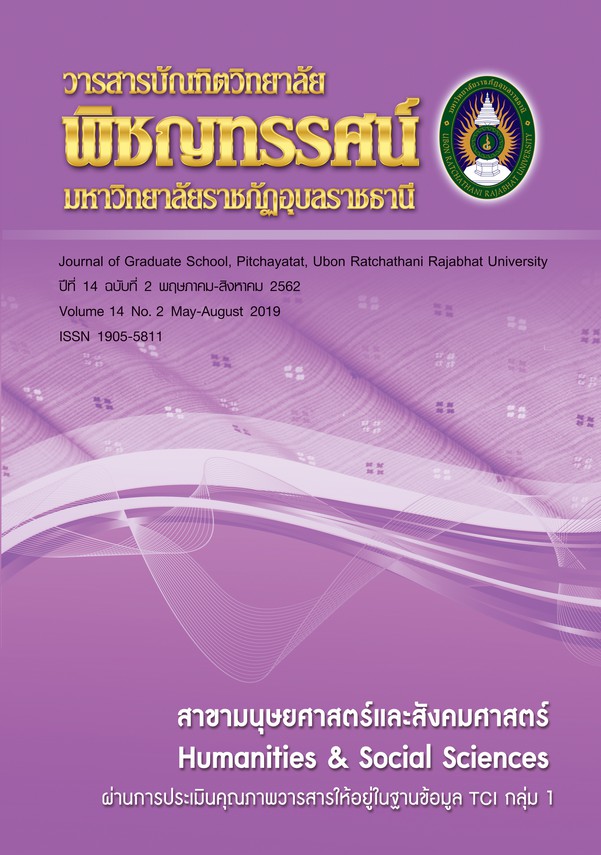บทเพลงแม่น้ำโขง : ภาพสะท้อนสังคมวัฒนธรรมความสัมพันธ์ไทย-ลาว
คำสำคัญ:
บทเพลงแม่น้ำโขง, ภาพสะท้อนสังคมวัฒนธรรม, ความสัมพันธ์ไทย-ลาวบทคัดย่อ
บทความวิจัยนี้มีวัตถุประสงค์เพื่อศึกษาเนื้อหาของบทเพลงแม่น้ำโขงที่สะท้อนสังคมวัฒนธรรม ซึ่งการวิจัยในครั้งนี้ใช้วิธีการวิจัยเชิงคุณภาพ โดยรวบรวมและศึกษาเพลงแม่น้ำโขงของไทยจำนวน 33 เพลง ทำการวิเคราะห์เนื้อหาของบทเพลงแม่น้ำโขงโดยวิธีพรรณนาวิเคราะห์โดยใช้ทฤษฎีโครงสร้างหน้าที่และทฤษฎีนิเวศวัฒนธรรม ผลการศึกษาพบว่าบทเพลงแม่น้ำโขงมีเนื้อหาที่สะท้อนสังคมวัฒนธรรม สามารถแบ่งตามพฤติกรรมจากสังคมวัฒนธรรมออกเป็น 4 ลักษณะ คือ 1) เนื้อหาเกี่ยวกับความสัมพันธ์และผูกพันของไทย-ลาว พบมากที่สุด 2) เนื้อหาเกี่ยวกับนิเวศวัฒนธรรม 3) เนื้อหาด้านการรวมกลุ่มเกี่ยวกับครอบครัว และ 4) เนื้อหาเกี่ยวกับศาสนาและประเพณี
เอกสารอ้างอิง
ยศ สันตสมบัติ. มนุษย์กับวัฒนธรรม. กรุงเทพฯ: สำนักพิมพ์มหาวิทยาลัยธรรมศาสตร์, 2540.
ศิริพร กรอบทอง. วิวัฒนาการของเพลงลูกทุ่งในสังคมไทย พ.ศ.2481-2535. วิทยานิพนธ์ปริญญาอักษรศาสตรมหาบัณฑิต. กรุงเทพฯ : จุฬาลงกรณ์มหาวิทยาลัย, 2541.
ศิริรัตน์ แอดสกุล. ความรู้เบื้องต้นทางสังคมวิทยา. พิมพ์ครั้งที่ 3. กรุงเทพฯ: จุฬาลงกรณ์มหาวิทยาลัย, 2557.
สมศักดิ์ ศรีสันติสุข. การศึกษาสังคมและวัฒนธรรม :แนวคิดวิธีวิทยา และทฤษฎี. พิมพ์ครั้งที่ 2. ขอนแก่น: อมรินทร์ก๊อปปี้, 2545.
อัมพร จิตรักษา. ศึกษาภาพสะท้อนทางสังคมและวัฒนธรรมที่ปรากฏในเพลงลูกทุ่ง ที่ขับร้องโดยเอกชัย ศรีวิชัย. วิทยานิพนธ์ปริญญา
ศิลปศาสตรมหาบัณฑิต มหาวิทยาลัยทักษิณ, 2543.
ดาวน์โหลด
เผยแพร่แล้ว
รูปแบบการอ้างอิง
ฉบับ
ประเภทบทความ
สัญญาอนุญาต
บทความทุกเรื่องได้รับการตรวจความถูกต้องทางวิชาการโดยผู้ทรงคุณวุฒิภายนอกอย่างน้อย 3 คน ความคิดเห็นในวารสารพิชญทรรศน์เป็นความคิดเห็นของผู้นิพนธ์มิใช่ความคิดเห็นของผู้จัดทำ จึงมิใช่ความรับผิดชอบของวารสารพิชญทรรศน์ และบทความในวารสารพิชญทรรศน์สงวนสิทธิ์ตามกฎหมายไทย การจะนำไปเผยแพร่ต้องได้รับอนุญาตเป็นลายลักษณ์อักษรจากกองบรรณาธิการ





